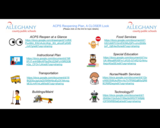
A presentation with links to specific information about the Alleghany schools reopening plans
- Subject:
- Cross-Curricular
- Material Type:
- Reading
- Date Added:
- 09/03/2020

A presentation with links to specific information about the Alleghany schools reopening plans

This resource includes a student HyperDoc and associated "apply" task to ensure student understanding.Title: Allusion & Figurative Language LessonTopic: Literary Allusion & Figurative LanguageEducational Standards: SOL 9.3.eSubject Area: English 9

This guided reading of Edgar Allan Poe’s “Alone” (1829) focuses on developing student understanding of imagery and other figurative language, strengthening reading comprehension, and strengthening expository and persuasive writing skills.
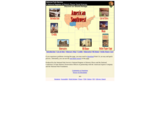
presents a travel itinerary of 58 historic places across Arizona, Colorado, and New Mexico. It includes forts built to protect mail routes and settlers, missions and churches, prehistoric cliff dwellings, trading posts, petroglyphs (from the petrified forest), pit house villages, and Indian villages home to the Anasazi, Sinagua, Zuni, and other Native American tribes.

This informational text explains that while both the Arctic and Antarctica are cold, Antarctica is much colder and drier - a polar desert. The text is written at a grade two through grade three reading level. This is a PDF containing the informational text and a glossary.
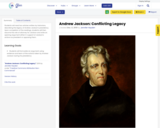
Students will read two articles written by historians, describing the legacy of Andrew Jackson's presidency. Upon completion of the readings, students will then assume the role of attorney for Jackson and write an opening argument either in support of Jackson's actions as president or opposing them.

This guided reading of Edgar Allan Poe’s “Annabel Lee” (1849) focuses on developing student understanding of imagery and other figurative language, strengthening reading comprehension, and strengthening expository and persuasive writing skills.

This informational text explains that while both the Arctic and Antarctica are cold, Antarctica is much colder and drier - a polar desert. The text is written at a grade four through grade five reading level. This is a PDF containing the informational text and a glossary.
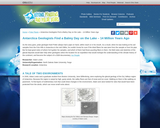
This article describes a discovery of moss and ostracod fossils that led to a better understanding of Antarctica's climate history.
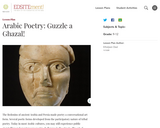
The Bedouins of ancient Arabia and Persia made poetry a conversational art form. Several poetic forms developed from the participatory nature of tribal poetry. Today in most Arabic cultures, you may still experience public storytelling and spontaneous poetry challenges in the streets. The art of turning a rhyme into sly verbal sparring is considered a mark of intelligence and a badge of honor. Students will learn about the origins and structure of Arabic Poetry.
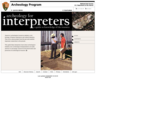
Help students learn about archaeological methods and how archaeological interpretations are made. It is organized around questions that include: What is archeology? What do archaeologists do? How do archaeologists determine how old things are?

information for parents, students, and staff
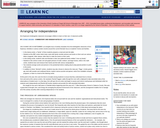
Erin Espinoza's kindergarten classroom encourages children to learn on their own. A classroom profile.
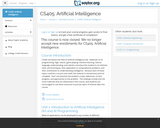
This course includes materials on AI programming, logic, search, game playing, machine learning, natural language understanding, and robotics, which will introduce the student to AI methods, tools, and techniques, their application to computational problems, and their contribution to understanding intelligence. The material is introductory; the readings cite many resources outside those assigned in this course, and students are encouraged to explore these resources to pursue topics of interest. Upon successful completion of this course, the student will be able to: Describe the major applications, topics, and research areas of artificial intelligence (AI), including search, machine learning, knowledge representation and inference, natural language processing, vision, and robotics; Apply basic techniques of AI in computational solutions to problems; Discuss the role of AI research areas in growing the understanding of human intelligence; Identify the boundaries of the capabilities of current AI systems. (Computer Science 405)
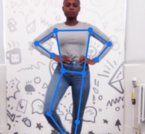
This lesson plan explores Artificial Intelligence using Teachable Machine, a program that uses images and sounds to create machine models.
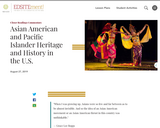
The month of May is an opportunity for reflection on and commemoration of all that AAPI individuals and organizations have accomplished and contributed to U.S. history and culture. This piece highlights NEH projects and classroom resources for teaching about these experiences in America.

This Readers Theater script includes parts for 8-9 students. It is based on the Feature Story, At Home in the Cold and discusses various adaptations that allow animals to survive in the cold oceans of the Arctic and Antarctica. The script was written for students in grades 4-5.

This script for choral reading was written to be used with two groups of students. The script is based on the Feature Story, At Home in the Cold and discusses various adaptations that allow animals to survive in the cold oceans of the Arctic and Antarctica. The script is appropriate for use with students in grades K-1.

This informational text explores adaptations that allow penguins, whales, walruses, seals, and fish to live in the cold water of the Arctic and Southern Oceans. The text is at reading level appropriate for students in second through third grade. It is a PDF file that contains text as well as a glossary.